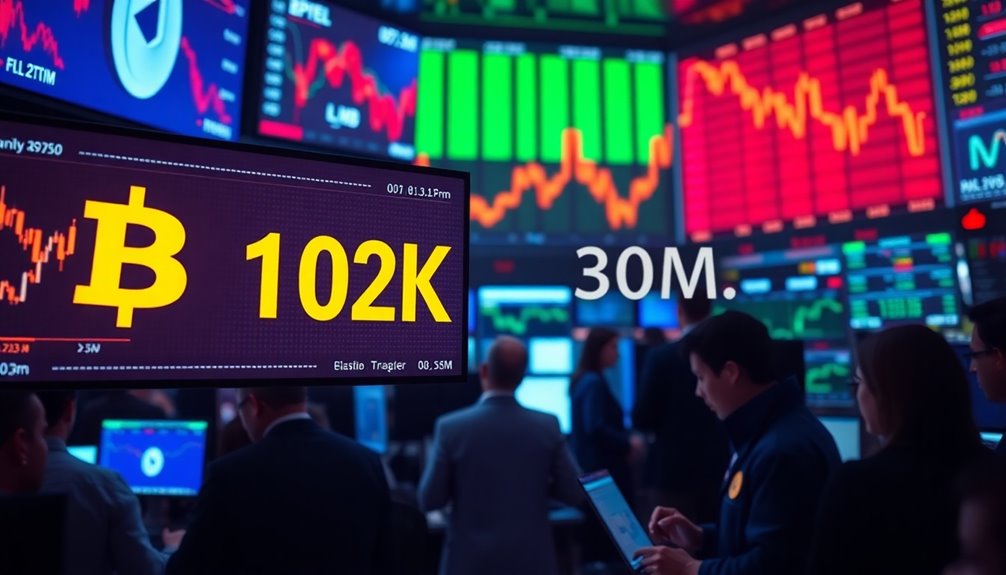Crypto liquidations have exceeded $300 million today, coinciding with Bitcoin’s climb past $102,000. This surge highlights the extreme market volatility fueled by shifting investor sentiment and positive news. As enthusiasm builds, many are jumping into the market, leading to rapid price changes. However, be aware that negative headlines can also trigger sell-offs. Additionally, regulatory changes are reshaping the landscape, attracting institutional investors and increasing market sophistication. With these dynamics in play, it’s essential to stay informed about the latest trends and how they might impact your investments going forward. Traders are encouraged to analyze crypto market cap insights, as these metrics can offer valuable perspectives on market trends and asset performance. Understanding the distribution of market capital among the leading cryptocurrencies can help identify potential opportunities or risks. As the landscape evolves, keeping an eye on emerging technologies and shifts in regulatory frameworks will be crucial for making informed investment decisions.
Key Takeaways
- Today's cryptocurrency market experienced significant volatility, with liquidations exceeding $300 million as traders reacted to rapid price changes.
- Bitcoin's price surged past $102K, driven by positive investor sentiment and increased institutional interest.
- The Fear & Greed Index reached extreme greed at 84, indicating heightened confidence among investors.
- Regulatory clarity, particularly from entities like the SEC, is attracting more institutional funds into the crypto market.
- Social media plays a crucial role in amplifying market reactions, contributing to both price surges and declines.
Market Volatility Spikes Today

As market sentiment shifts rapidly, today's volatility in the cryptocurrency market has exceeded expectations, with liquidations surpassing $300 million. You'll notice how investor sentiment plays a crucial role in driving these price fluctuations. Positive news can send prices soaring, while negative headlines often trigger steep declines. Social media amplifies this impact, spreading information like wildfire and prompting immediate reactions. Fear, uncertainty, and doubt (FUD) can lead to herd behavior, causing mass sell-offs that erode liquidity. Additionally, regulatory announcements often create unexpected shifts, further exacerbating volatility. Economic indicators also play a part, with downturns sometimes making cryptocurrencies appear as safer investments. The interplay of these factors keeps you on your toes in this unpredictable market. Recent developments suggest that institutional investment in Bitcoin is increasingly viewed as a strategy for risk diversification.
Regulatory Changes Impacting Crypto

Market volatility isn't just influenced by investor sentiment; regulatory changes are also playing a significant role in shaping the cryptocurrency landscape.
You'll notice that global frameworks like the EU's MiCA regulation and the OECD's CARF are setting new standards. In the U.S., states like Wyoming and Texas are leading with progressive laws, while federal movements hint at a more structured approach, including the formation of a crypto advisory council. However, the SEC's classification of most cryptocurrencies as securities adds complexity, and varying state regulations create confusion. The IRS now requires detailed transaction reporting, and emerging trends like the national Bitcoin reserve proposal could foster innovation. Moreover, the anticipated collaboration between public and private sectors in the blockchain industry is expected to drive further regulatory adaptations.
Staying informed about these changes is crucial for navigating the evolving crypto environment.
Investor Sentiment Shifts Rapidly

Investor sentiment in the cryptocurrency market can shift dramatically within a short period, often influenced by external factors like news events and regulatory changes.
Currently, the sentiment score stands at 54, reflecting a neutral stance among investors. Just a year ago, on January 16, 2023, sentiment was bullish at 77, while it was bearish at 43 in January 2022. The Fear & Greed Index also plays a crucial role, hitting 84 recently, indicating extreme greed. Indexed annuities can serve as a potential hedge against inflation, which is a concern for many investors amid fluctuating market conditions.
In light of this, the overall market sentiment is currently bullish as indicated by a sentiment score of 100.
Emotional responses, driven by market demand and supply fluctuations, security breaches, and social media buzz, can prompt swift price movements.
As you monitor these indicators, remember that understanding market sentiment is key to making informed trading decisions.
Large Funds Entering Market

With regulatory clarity paving the way, large funds are increasingly entering the cryptocurrency market, signaling a shift in how institutional investors view digital assets.
Major financial institutions like JPMorgan and Fidelity are now offering Bitcoin services, responding to client demand for cryptocurrency exposure. This institutional endorsement legitimizes crypto as a viable investment instead of a mere speculative asset.
You'll notice heightened trading volumes as banks and asset managers actively participate, enhancing their offerings through partnerships with exchanges and custodial firms. As these institutions engage with crypto investment funds, they can provide their clients with diversified exposure to the digital asset market.
Surveys show that nearly 40% of institutional investors now have crypto exposure, highlighting a growing interest.
As these funds deploy more capital, you can expect a more sophisticated and dynamic market landscape, benefiting everyone involved.
Elections Affecting Market Trends

As elections approach, the cryptocurrency market often faces heightened uncertainty, which can lead to significant price fluctuations. Changes in leadership can shift regulatory stances, impacting your investments. If a pro-crypto candidate wins, you might see optimism and favorable policies emerge. Conversely, an anti-crypto candidate could trigger sell-offs as stricter regulations loom. Congressional dynamics also play a crucial role; crypto-friendly lawmakers can promote innovation, while restrictive policies can dampen market sentiment. Historically, elections have caused volatility, but post-election periods often lead to recovery and price increases. Understanding these dynamics helps you navigate the market's unpredictable nature during these times, ultimately influencing your investment strategies. Historical data suggests potential for growth post-election periods as evidenced by significant price increases following the 2016 and 2020 elections. Additionally, such fluctuations can mirror the social media impact on public figures, further amplifying market reactions.
Emerging Technologies Driving Growth

Emerging technologies are revolutionizing the cryptocurrency landscape, driving significant growth and reshaping how we interact with digital assets.
You'll notice that institutional adoption is on the rise, with hedge funds and banks investing heavily in cryptocurrencies and blockchain solutions. This shift indicates a growing trend towards long-term investment strategies, moving away from mere speculation.
Innovations like Layer 2 technologies and Ethereum's Proof of Stake improve efficiency and scalability, making crypto more viable for everyday transactions. As these technologies evolve, they will also benefit from advancements in machine learning algorithms, enhancing overall security and transaction speed.
Companies like Starbucks are accepting crypto, pushing mass adoption forward.
Meanwhile, NFTs and DeFi are creating new markets, allowing fractional ownership and innovative gaming economies.
As regulations clarify and payment processors integrate crypto, you can expect these technologies to push growth further, making digital assets an integral part of your financial future.
Frequently Asked Questions
What Are Crypto Liquidations and How Do They Occur?
Crypto liquidations happen when you need to convert your assets into cash to cover losses or repay borrowed funds.
They can be partial or total; partial means selling some assets to avoid complete loss, while total involves selling everything to offset losses.
Triggers include failing margin requirements, high leverage, and unfavorable market conditions.
Understanding these factors is crucial for managing risk and protecting your capital in volatile markets.
How Does Bitcoin's Price Affect Altcoins?
When Bitcoin's price rises, you'll notice a significant impact on altcoins. As Bitcoin gains dominance, investors often focus their attention and capital on it, leading to decreased trading volumes for altcoins.
Historically, altcoins tend to follow Bitcoin's price movements, so when BTC rallies, many altcoins benefit.
However, during these times, be cautious of increased volatility and speculation, as they can create both opportunities and risks in the altcoin market.
What Should Investors Consider Before Trading Cryptocurrencies?
Before diving into cryptocurrency trading, consider this: Are you prepared for the wild ride?
You should assess market volatility, as prices can swing dramatically. Ensure you've chosen a reputable broker with solid security measures.
Think about liquidity; can you exit your position without causing a price drop?
Finally, stay informed about regulatory changes that could impact your investments. Knowledge is your best ally in navigating this unpredictable landscape.
How Can Investors Protect Themselves From Liquidations?
To protect yourself from liquidations, start by setting stop-loss orders to limit potential losses.
Maintain a sufficient margin balance and check it regularly to avoid falling below maintenance rates.
Diversify your investments to spread risk across different assets, and consider using stablecoins to hedge against volatility.
Lastly, implement risk management strategies like leverage control and automated trading systems to enhance your ability to respond quickly to market changes.
What Role Do Exchanges Play in Crypto Liquidations?
Exchanges play a pivotal role in crypto liquidations, like referees ensuring fair play. They initiate liquidations when your margin account dips below the required level, automatically closing your positions to cover losses.
This process can happen swiftly, often at market prices, leading to significant financial hits. By managing risks, exchanges protect themselves and traders from further losses, maintaining a delicate balance in the volatile crypto market.
Always stay vigilant to avoid forced liquidations.
Conclusion
As Bitcoin surges past $102k, it's easy to feel anxious about the sudden volatility in the market. But remember, every spike brings opportunity. Sure, liquidations exceeding $300 million might sound alarming, but they also highlight a thriving ecosystem where investors are eager to engage. Embrace the excitement of this moment! With large funds entering the fray and emerging technologies at our fingertips, now's the time to stay informed and seize the potential for growth.









